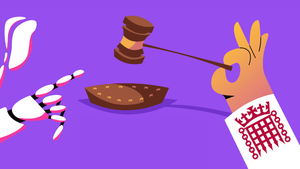The House Of Lords has once again voted through an amendment to the Data Bill that is working its way through Parliament that would force AI companies to be transparent about what copyright protected works they are utilising when training generative AI models.
The creative industries have been calling for those transparency measures, so that rightsholders can see if their content has been used to train AI models without permission, potentially opening the door for them to sue for copyright infringement.
However, the UK government doesn’t want to deal with any issues to do with copyright and AI in this legislation, and stripped out copyright provisions previously added by the Lords last time it reviewed the bill.
Continuing the legislative ping pong match between the Lords and the Commons, where the government has its massive majority, the Lords passed a revised amendment yesterday, proposed by film-maker Beeban Kidron. This re-revised version of the Data Bill will now go back to the Commons where, presumably, the government will urge MPs to once again remove the Lords’ AI transparency measures.
Dubbing the Lords vote a “sensational result” after it passed with a significant majority in favour - 272 votes for transparency vs 125 against - Tom Kiehl, CEO of UK Music, the cross-sector lobbing group, called on MPs to take “a once in a generation chance to stop AI from stealing music”.
The government, he added, “must take this unique opportunity to adopt a ‘transparency first’ approach to the way AI companies handle the works of creators and music businesses”.
Kidron previously worked in the Lords’ chamber to secure amendments to the Data Bill that would achieve two things. First, require all AI platforms marketing their products in the UK to comply with British copyright law, and second, oblige AI companies to be transparent about what creative works they have used when training their AI models.
Those amendments were removed by the government when the bill was being considered in the Commons, and attempts by opposition MPs to get them reinserted last week were unsuccessful. Which meant the version of the bill that returned to the Lords yesterday had nothing about the copyright or transparency obligations of AI companies.
This time Kidron focused specifically on the transparency obligations, a compromise that ensured the support of Conservative frontbench members of the Lords, who previously abstained on her amendments.
The new amendment says that the government must introduce regulations so that AI companies operating in the UK will have to “provide copyright owners with information regarding the text and data used in the pre-training, training, fine-tuning and retrieval-augmented generation in the AI model, or any other data input to the AI model”.
Earlier this year the government undertook a massive consultation on copyright and AI, and officials are still working their way through the 11,500 submissions made to that consultation. Technology minister Peter Kyle and culture minister Chris Bryant are adamant that the various copyright issues raised by AI should be dealt with by separate bespoke legislation informed by that consultation at a later date.
However, by focusing on the transparency obligation of AI companies in particular, Kidron argued in the Lords yesterday that her new amendment “would not change copyright”. She added, “We do not need to change copyright law. We need transparency so that we can enforce copyright law, because what you cannot see you cannot enforce”.
Her revised amendment, she added, “would simply provide that a copyright holder be able to see who took their work, what was taken, when and why, allowing them a reasonable route to assert their moral right to determine whether they wish to have their work used, and if so, on what terms”.
In the documentation around its consultation, the government also proposed transparency obligations for AI companies, but alongside the proposal that a new text and data mining exception be introduced to benefit AI companies, albeit with an opt-out for rightsholders.
The creative industries, including the music industry, argue that the transparency obligations - which they support - and the copyright exception - which they oppose - are too separate things. Therefore transparency obligations can be added now, and other copyright matters dealt with later.
Ahead of yesterday’s Lords vote, numerous creators and performers - and music, media and other creative companies and organisations - signed an open letter supporting Kidron's latest amendment.
The letter - signed by Elton John, Paloma Faith, Wretch32, Coldplay and Giles Martin, among many others - urged Lords and MPs to “put transparency at the heart of the copyright regime and allow both AI developers and creators to develop licensing regimes that will allow for human-created content well into the future”.
We now await to see how the government deals with Kidron’s latest amendment when the Data Bill returns to the Commons.

